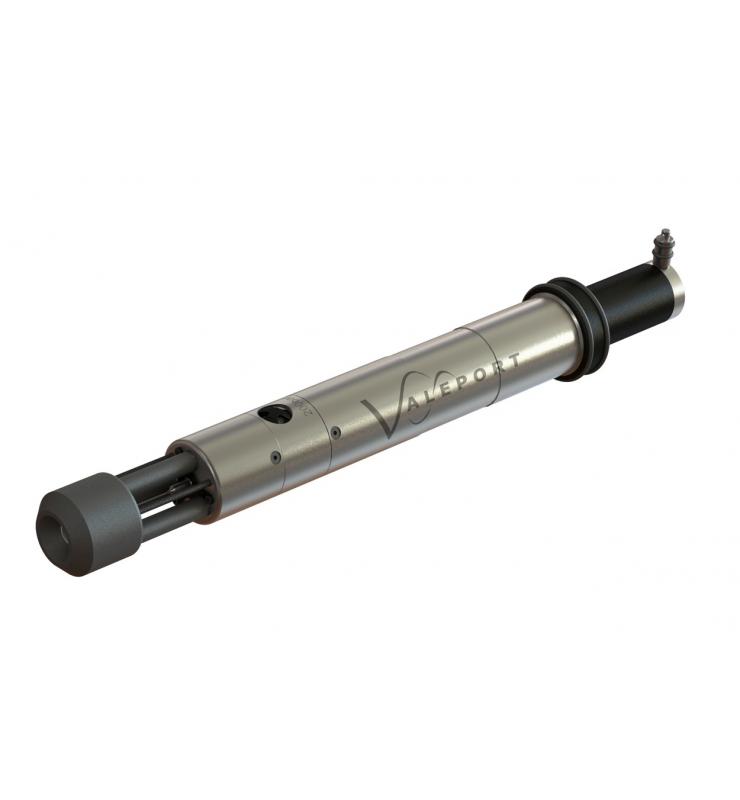An evolution of the miniCTD, the fastCTD Profiler is designed to deliver the highest quality CTD casts at fast drop rates. A conductivity cell designed for optimum flow-through, a fast-response thermistor temperature sensor and a 0.01% pressure sensor synchronously sampling at up to 32Hz deliver the highest quality profiles in a lightweight and robust package.
Add in an integral Fluorometer based on Valeport's new Hyperion range, an optional Bluetooth communications module and the fastCTD Profiler offers a unique and versatile solution.
Sensors
Conductivity
Range: 0 – 80 mS/cm
Resolution: 0.001mS/cm
Accuracy: ±0.01mS/cm
Response: 30 milliseconds
Temperature
Range: -5°C to +35°C
Resolution: 0.001°C
Accuracy: ±0.01°C
Response: 50 milliseconds
Pressure
Range: 50, 100, 200, 300 or 600 Bar
Resolution: 0.001% full scale
Accuracy: ±0.01% full scale
Response: 1 millisecond
Fluorometer (Optional)
Chlorophyll a
Excitation: 470nm
Detection: 696nm
Dynamic Range: 0-800 μg/l
Detection limit: 0.025 μg/l
Linearity: 0.99 R2
Response Time:Dependent on operational mode
Fluorescein
Excitation: 470nm
Detection: 545nm
Dynamic Range:0-500 ppb
Detection limit:<0.01ppb
Linearity: 0.99 R2
Response Time:Dependent on operational mode
Rhodamine
Excitation: 520nm
Detection: 650nm
Dynamic Range:0-1000 ppb
Detection limit:<0.01ppb
Linearity: 0.99 R2
Response Time:Dependent on operational mode
Electrical
Internal: 1x D cell - 1.5V Alkaline or 3.6V Lithium
External: if fitted with a connector 9 – 28V DC isolated
Power: <250mW
Connector: SubConn MCBH10F (if fitted)
Sampling Modes
Continuous: Regular and synchronous data collection from all sensors up to 32Hz
Profile: Data is logged as the instrument descends (or rises), by a user defined pressure difference, through the water column.
Rapid: Once the instrument is set to run mode no data is logged until a programmed trigger depth is reached (for example, 2 metres below the surface). Completely programmable, the device can be set to record down cast data only, for example, when the probe stops descending and rises by a defined amount logging is stopped.
Communications
The instrument is designed to operate autonomously, with setup and data extraction performed over a Bluetooth connection with a PC before and after deployment.
Multiple profiles can be recorded in the instrument by switching it on then off with the magnetic switch key. Bluetooth auto-pairing and discovery make connecting to the instrument simple and robust.
The instrument can also operate in real time or cabled comms. Supplied with a traditional SubConn connector with a choice of communication protocols fitted as standard and selected by pin choice on the output connector:
Direct Reading
RS232: Up to 200m of cable
RS485: Up to 1000m of cable
Baud Rate: 38400 to 460800.
Protocol: 8 data bits, 1 stop bit, no parity, no flow control
Memory
Solid state non-volatile Flash memory
Capacity: > 10 million lines of data (equivalent to 5,000 profiles to 1,000m with a 1m profile resolution)
Physical
Materials: Acetal or Titanium housing, Polyurethane and ceramic sensor components
Depth Rating: 500m (Acetal) / 6000m (Titanium)
Instrument Size: φ54mm x 510mm
Weight in air: Titanium: 2.5 kg | Acetal: 1.5 kg | Cage: 2.5 kg
Weight in water: Titanium: 1.5 kg | Acetal: 0.5 kg
Software
Supplied with DataLog x2 Windows based software, for instrument setup, control, data extraction and display.

